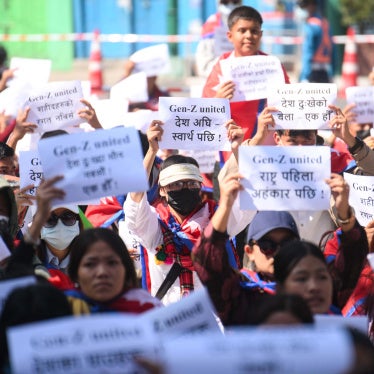(New York) - On November 12, Human Rights Watch will give its highest recognition to Tiawan Gongloe, a leading Liberian human rights lawyer and torture victim. An August peace agreement ended fourteen years of civil war in the West African nation.
As vital defender of the rule of law in Liberia, Tiawan Gongloe has often spoken out against government and rebel abuses at great personal risk. In April 2002, he was detained without charge and tortured after giving a speech on the role of non-governmental groups in bringing peace to the region.
“During the darkest days of Liberia’s civil conflicts, Tiawan Gongloe was a beacon of hope,” said Binaifer Nowrojee, counsel with Human Rights Watch’s Africa divison. “Without Mr. Gongloe’s courageous intervention, many political detainees, journalists, and other victims of abuse would have languished in prison – or worse.”
President Charles Taylor, a former warlord in power from 1997 until his August 2003 exile to Nigeria, systematically silenced all critical voices. During this time, journalists, political opposition and human rights activists came under attack and were regularly subject to violence at the hands of Taylor’s security forces. Taylor regularly manipulated the courts to bring politically-motivated criminal charges.
As the rebel incursion worsened, the Taylor government became ever more heavy-handed. As critics began to flee the country for fear of their lives, Mr. Gongloe stayed. Whenever an organization or an individual came under attack by the government, Mr. Gongloe was there, indefatigably appearing in court and speaking out publicly.
“Liberians in trouble always knew Tiawan Gongloe’s door was open,” said Nowrojee.
In April 2002, Mr. Gongloe was arrested without charge and detained overnight in police custody. By the following morning, he had been brutalized so severely he was unable to stand. His body and head were badly bruised, he was urinating blood, had lost some hearing in his left ear and one of his eyes was bloodied. In the morning, when he was taken again for police interrogation, he was unable to stand or sit as a result of his injuries. Lawyers who had been notified of his whereabouts finally pressured the police to hospitalize him.
Although no charges were ever brought, Mr. Gongloe was arrested for a speech he gave at a March 2002 conference in neighboring Guinea on peace in the region. The speech dealt with the important role of civil society groups in the attainment of peace. He also condemned the use of violence as a means to state power. The same day Mr. Gongloe was arrested, the government closed down The Analyst newspaper, which had just printed a copy of the speech.
Mr. Gongloe’s arrest prompted a local and international outcry. With pressure from Human Rights Watch and others, the government did transfer Mr. Gongloe to a hospital. Fearing that he would be rearrested and tortured again on his release from the hospital, Human Rights Watch helped organize for Mr. Gongloe and his family to leave Liberia. He is currently based in Philadelphia, where he is recuperating.
“Tiawan Gongloe embodies the hope for justice and stability for so many Liberians,” said Nowrojee. “The nation will need citizens with his incredible courage and strength to rebuild.”
As of November 2003, Liberia remains volatile. Despite the arrival of West African and U.N. peacekeepers, and the deployment of a transitional government in the capital Monrovia, fight still continues in some area. Outside urban areas, ragtag government militias and fighters from both rebel groups—Liberians United for Reconciliation and Democracy (LURD) and the splinter group of ex-LURD members called the Movement for Democracy in Liberia (MODEL)—continue to terrorize civilians.
Hundreds of thousands of Liberians remain displaced. In some areas, killings, abductions, rapes, and looting by fighters from all sides continues. When the security situation stabilizes, Mr. Gongloe intends to return to Liberia to help rebuild the nation’s shattered justice system.
“What Liberia desperately needs today is to rebuild a culture of respect for human rights and the rule of law," said Tiawan Gongloe. “That is my mission.”






